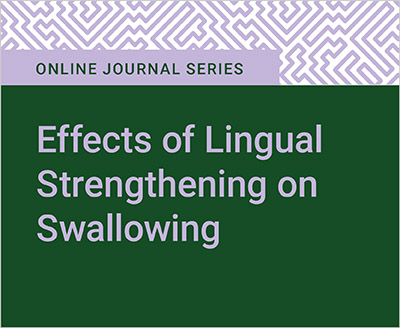ASHA Learning Pass
Log in and check out the Dashboard to view featured courses.

Effects of Lingual Strengthening on Swallowing (WEB3330)
Research into programmed isometric lingual exercise in order to improve swallow function has yielded promising results. This journal self-study examines evidence related to this relatively new therapeutic approach. The first article in this self-study offers a review of the recent literature on isometric lingual tasks across a variety of populations and includes clinical implications based on the findings. The second and third articles are normative studies about adults without diagnosed dysphagia. One explores how tongue strengthening affects mealtime functioning in older, long-term care residents, while the other examines relationships between performance variability, isometric strength, swallowing pressure, age, and gender.
Learning Outcomes
You will be able to:
- explain the principles supporting the use of isometric lingual tasks, strengthening protocols, and results with various clinical populations
- summarize preliminary findings regarding the benefits of lingual strengthening exercises on mealtime functioning
- describe the relationship between lingual strength and performance variability across ages and genders
Contents
The following articles are included in this course:
- A Systematic Review of Isometric Lingual Strength-Training Programs in Adults With and Without Dysphagia, by Victoria S. McKenna, Bin Zhang, Morgan B. Haines, and Lisa N. Kelchner
- Effects of Tongue Strength Training on Mealtime Function in Long-Term Care, by Ashwini M. Namasivayam-MacDonald, Lynsey Burnett, Ahmed Nagy, Ashley A. Waito, and Catriona M. Steele
- Age-Related Variability in Tongue Pressure Patterns for Maximum Isometric and Saliva Swallowing Tasks, by Melanie Peladeau-Pigeon and Catriona M. Steele
Learning Assessment
Online, multiple-choice exam